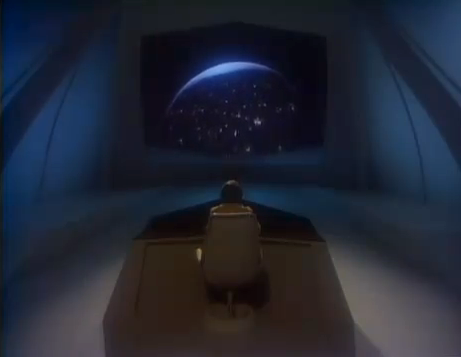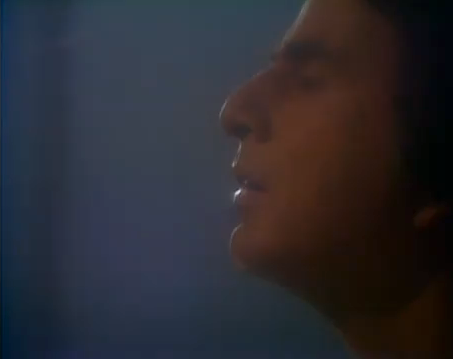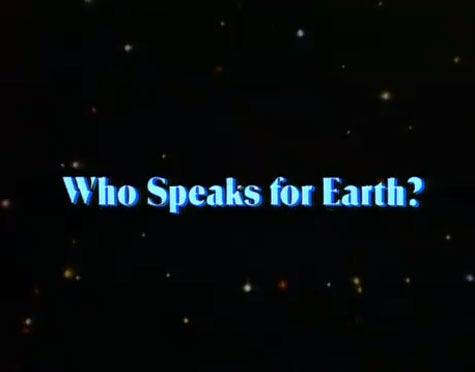The final episode of Cosmos, “Who Speaks for Earth?”, is a climactic wrap-up where Carl Sagan summarizes both the nightmarish behavior of our species and the possible alternatives to that behavior. As the Netflix info-box says, this episode is “a prognosis for Earth” that weighs humanity’s successes and failures. The episode opens by juxtaposing the actions of respectful European traders in Alaska with those of the conquistadors, and goes from there to a wrenching description of a dream of Sagan’s. In that dream, he is exploring space, and comes upon a planet as it snuffs out, only to return to find Earth snuffed as well. That leads to an impassioned discussion of nuclear weapons. Furthermore, Sagan explores the destruction of the Library of Alexandria and the murder of Hypatia. But, from there, he moves into a positive, uplifting close about the lifespan of the universe, our species, and the ability we have to choose life over death.
This episode is not merely a collage of prior shots, or a recap, though it uses techniques of repetition and reflection. Rather, it is a summative argument that calls upon the twelve preceding episodes’ scientific and educational work to make a grand argument—this episode pulls everything together with powerful results. It is a perfect culmination of what has come before, and ultimately the ideal way for Sagan to close a series so far-reaching and invested in joy and wonder as Cosmos. Sagan is also, of course, at his most serious here, and his most pessimistic. The balance is delicate.
“As the ancient mythmakers knew, we are children equally of the earth and the sky. In our tenure on this planet we’ve accumulated dangerous evolutionary baggage: propensities for aggression and ritual, submission to leaders, hostility to outsiders, all of which puts our survival in some doubt. But we’ve also acquired passion for others, love for our children, desire to learn from history and experience, and a great, soaring, passionate intelligence, the clear tools for our continued survival and prosperity. Which aspects of our nature will prevail is uncertain.”
This is such an intense episode. Again, as with my favorite episode (“The Persistence of Memory”), the introductory quote that strikes me as the most significant is actually a paragraph. The major idea, repeated again and again with increasing poetry in this episode, is that the Earth is one planet and that humanity is one species: a radical universality, when faced with the vastness of the cosmos and the danger of divisions within our world. Sagan’s primary point, at the culmination of Cosmos, is that we should look at our planet as a whole, not a thing full of boundaries. We are miniscule in the cosmos, but we are also one.

But will we, and all societies like ours, destroy ourselves? As Sagan says, “I dream about it. And sometimes they’re bad dreams.” The dream narrative is hideously serious, the most somber and relentless that Sagan has ever been in Cosmos. I admire and respect the effectiveness of this sequence, and how it must have felt to see this on the first broadcast, during the Cold War. The planet that Sagan visits destroys itself—already a strong and eerie moment, particularly as we watch his face. When Sagan sits in his navigation chair, staring into the distance in thought, silenced by sorrow as he returns to Earth—we know it’s not over. And, it isn’t. The moment the Earth’s broadcasts cease, suddenly, is still stunning, though not as stunning as Sagan’s speech overlaying the rest of the scene: “There would be no more big questions, and no more answers, never again a love or a child, no descendants to remember us and be proud, no more voyages to the stars, no more songs from the Earth.”

The dream narrative never fails to steal my breath with its intensity and its resonance. This is the danger of our species: the fact that we are very likely to destroy ourselves, to choose madness over thought, death over life. In this narrative, we had the options of “compassion, foresight, and reason. But instead, we listened to that reptilian voice within us, counseling fear, territoriality, aggression. We accepted the products of science; we rejected its methods.”
It’s not particularly analytical of me, but there seems to be nothing more to say to that—and to this entire sequence—than wow. Particularly after having watched the entire series, so full of wonder and enthusiasm and joy with only moments of threat, “Who Speaks for Earth?” kicks the viewer directly in the gut—partially because it’s so true and partially because it’s so frightening. And he’s not done yet; he then goes on to directly speak about nuclear war and the seriousness of the escalation of nuclear weapons. The direct facts about the “genies of death” that we have used science to create are undeniably horrifying—and I do wonder, on this episode’s first broadcast, how aware folks were of these facts already.
I’m also gutted by the story of Hypatia and the destruction of the library of Alexandria. Sagan is a deviously brilliant story-teller, and he generally uses that power to incite pleasures of wonder and delight—but not here. This time, he’s making terrible things very real for us; these frightening occurrences throughout history and the fact that they were entirely humanity’s doing becomes quite concrete. The none-too-subtle jabs at the Christian church and the rolling wheel of ignorance and fear, in the story of Hypatia, are possibly the sharpest Sagan has made yet. He’s not couching it, now. He’s being clear. I appreciate that he’s also direct about the fact that if science isn’t being used to contest and conquer the failures of society, it’s not doing it’s job—but when we work toward equality, and the sharing of knowledge, we’re doing something right.
The horrors lead us, however, into the close of the episode, which is ultimately positive and offers us a path of hope and wonder, if we’re willing to embrace it. By beginning with the birth of the universe, and taking us through all of the ground the series covered—all of the footage is from prior episodes—Sagan draws together things as disparate as Kepler and evolution and the Big Bang and laughter and dancing and the space shuttle launch. The ending is uplifting; and yet, for me, the first half of the episode is what looms largest in my memory. Though the ending is beautiful, and remains in the mind’s eye for a long time afterwards, the power of Sagan’s nightmare is what lingers forever. It could easily become real—and that’s what makes the ending matter. It’s not just joy without substance; it’s joy tempered by the knowledge of our potential self-destruction. It’s joy with a goal.
The point of Cosmos, in the end, seems to be about unity, science and survival. Science is a way to express our longing, like rituals, to be a part of and understand the cosmos, but:
“Its only sacred truth is that there are no sacred truths. All assumptions must be critically examined. Arguments from authority are worthless. Whatever is inconsistent with the facts, no matter how fond of it we are, must be discarded or revised. Science is not perfect. It’s often misused. […] But it’s the best tool we have.”
Science is how we can know the star stuff out of which we are made, and know ourselves. It’s how we can conquer deadly ignorance, and continue to survive—so long as we try harder, and communicate with each other, and try to conquer social injustices to create a unified planet. Cosmos is, finally, about our sense of wonder.
*
And that’s a wrap. Thank you for your time, your conversations, and your Sagan-esque enthusiasm.
Lee Mandelo is a writer, critic, and editor whose primary fields of interest are speculative fiction and queer literature, especially when the two coincide. She can be found on Twitter or her website.










